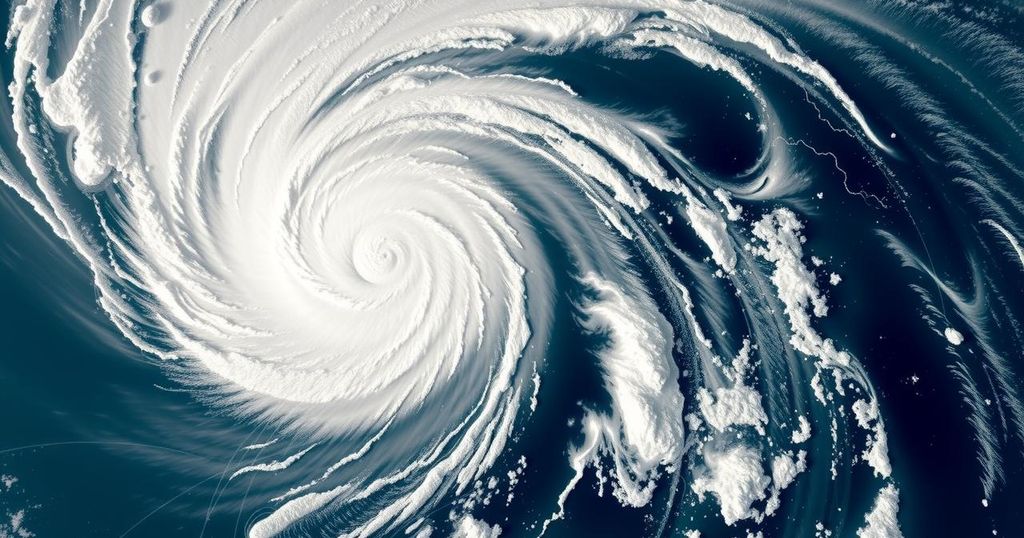Cyclone Chido Causes Devastation in Mayotte and Threatens Eastern Africa
Cyclone Chido has severely impacted Mayotte, with winds over 220 km/h causing widespread destruction. Officials report extensive damage but no casualties thus far. The cyclone is moving towards Mozambique, prompting emergency preparedness in surrounding nations, highlighting ongoing concerns about climate change and its effects on cyclone severity.
Cyclone Chido has inflicted severe damage upon Mayotte, a French territory located in the Indian Ocean, while progressing towards the eastern African coastline. With winds exceeding 220 kilometers per hour, the cyclone has resulted in significant destruction, tearing off metal roofs from residences and displacing communities in the region. As of now, there have been no reported casualties, although the extensive property damage has raised significant concerns among local officials.
Francois-Xavier Bieuville, the Prefect of Mayotte, noted on social media that this cyclone represents the most violent storm to impact the islands since 1934, stating, “Many of us have lost everything.” Following the cyclone’s passage, the highest alert has been rescinded to facilitate rescue operations, although residents remain under red alert and are urged to seek safe shelter. Only emergency personnel are permitted outdoors.
French Interior Minister Bruno Retailleau acknowledged the severity of Chido’s impact on Mayotte, adding that emergency services are actively engaged in relief efforts. Reports from local media indicate widespread power outages, destruction of small structures, and widespread fallen trees across the islands. In response, a contingent of 110 rescuers and firefighters has arrived from France and Reunion, with additional support expected.
The surrounding nation of Comoros is also grappling with the cyclone’s effects, as authorities have raised the highest red alert in several regions. Concerns have been heightened regarding a group of 11 fishermen who have not returned from sea. Measures such as directing all maritime vessels to remain in harbor and the closure of the main airport and government offices have been implemented to ensure public safety.
As Cyclone Chido continues its trajectory, it is predicted to impact Mozambique later at night or early Sunday morning, raising alarms that approximately 2.5 million individuals in the northern provinces of Cabo Delgado and Nampula could be affected. In preparation, Malawi and Zimbabwe are also bracing for potential flooding, urging residents in vulnerable areas to move to higher ground and prepare for evacuations.
Historically, the period between December and March marks the cyclone season in the southeastern Indian Ocean, which has seen an increase in frequency and severity of such storms. Past cyclones, including Idai in 2019 and Freddy in 2022, resulted in catastrophic loss of life across Mozambique, Malawi, and Zimbabwe. Research suggests that climate change exacerbates these weather events, leading impoverished nations in southern Africa, despite contributing minimally to global emissions, to confront extensive humanitarian crises.
Tropical cyclones frequently impact island nations and coastal regions, particularly during the cyclone season which spans from December to March in the southeastern Indian Ocean. These powerful storms pose significant risks, including extreme winds, torrential rains, and resultant flooding. Cyclone Chido’s trajectory further underscores the vulnerability of the Indian Ocean territories and nearby mainland countries to such natural disasters, impacting local economies, infrastructure, and public health. Historical data reveals that previous cyclones have had dire consequences, leading to substantial loss of life and property, which is exacerbated by existing challenges faced by these nations in terms of resilience and disaster preparedness. The increasing severity of these storms has been linked to climate change, highlighting the urgent need for global attention to the impacts of pollution and environmental degradation experienced by developing nations, which are often disproportionately affected despite their minimal contribution to the phenomenon. Authorities in affected regions must navigate the immediate aftermath of such disasters while preparing for ongoing vulnerabilities, including the potential for waterborne diseases and other health crises in the wake of flooding events.
In summary, Tropical Cyclone Chido has caused catastrophic damage to Mayotte, highlighting the vulnerabilities of island territories during cyclone season. The storm’s winds have led to extensive destruction, emergency services are mobilized for recovery efforts, and surrounding nations, particularly Comoros and Mozambique, are bracing for the storm’s further impacts. The historical context of cyclone occurrences underscores the significance of climate change in intensifying such weather phenomena, posing ongoing challenges for regional disaster preparedness and response. Immediate support and long-term strategies are essential to bolster resilience in the face of these increasingly frequent natural disasters.
Original Source: www.voanews.com




Post Comment